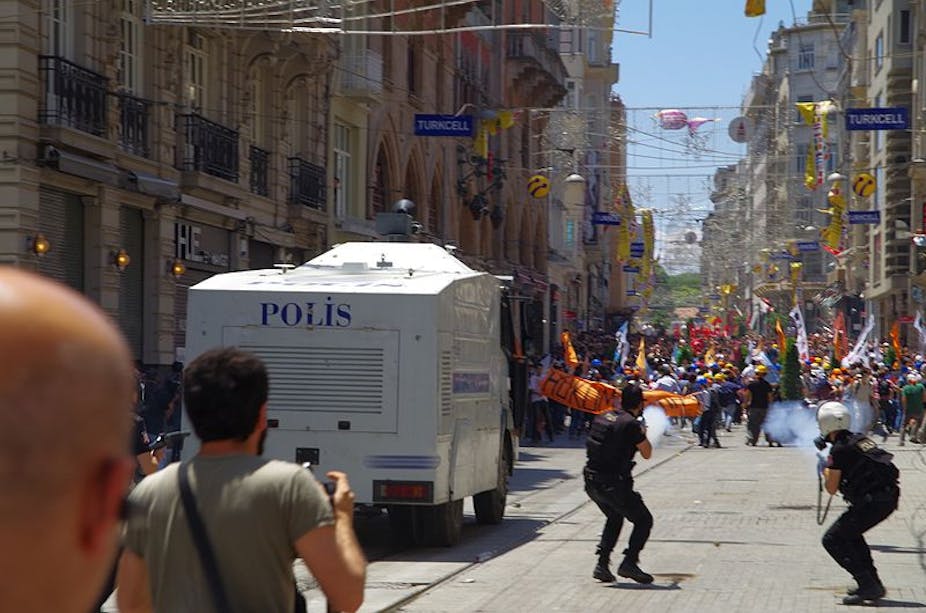While protesters were asleep, police stormed Istanbul’s Gezi Park using tear gas and water cannons. They set fire to the encampments. And yet pictures of bloodied protesters, or those blinded by plastic bullets, have not been shown in Turkey’s mainstream media. But images of such scenes have spread far and wide across social media. This has been a turning point in Turkish social and political history and also an eye-opener for many in terms of the traditional media.
The problems of the Turkish media are not news for academics who have been for years been talking and writing about a lack of press freedom, problems in its ownership structure, the media conglomerates’ close financial links with the political establishment, severe self-censorship among journalists and the lack of solidarity and professional trade unions in the country.
These issues are not new, but with the ruling AKP in power for more than a decade they have become more acute. Young people, as a result of biased and partisan media, have lost faith in print and visual media. Well-educated, respected correspondents and anchormen and women with critical voices have been systematically cleared from the newspapers and television screens. The media scene has gradually shifted to a pro-government structure and has begun to work as a propaganda tool of the ruling party, AKP.
Given such problems, it should be no surprise to see the powerful impact of social media on the young – desperate as they are to find an alternative way to find out what is going on in the world and share information with their friends.
Every element of news ignored by traditional media in recent weeks spread like wildfire across social media. Twitter became an obvious outlet for digitally literate people in search of information.
Cooking shows while Turkey burns
According to latest data from KONDA, a respected social research and polling company, 69% of the protesters who went to Gezi Park initially heard the news of the uprising from social media and only 7% from television. Two days after the first police attacks, while violent clashes between protesters and the police were taking place on the street of many cities, tear gas was all over Taksim Square and major neighbourhoods, the major news channels, like NTV and CNNTurk were airing documentaries on penguins or cooking shows. There was no sign of what was going on a national level.
In the meantime, almost all international news crews for major channels were reporting live from the field, conducting in-depth interviews with the protesters and trying to understand the anti-government sentiment. So resentment and anger towards the Turkish media has skyrocketed. Only three minor TV channels covered the events live, however, the regulatory agency, RTÜK, punished those channels with large fines for “inciting people to violence”. The prime minister, Tayyip Erdoğan kept intimidating the journalists who tried to do their jobs and threatened their editors. Media owners of large conglomerates could not take the risk of damaging their good relations with the government for their business interests.
In the meantime, Erdogan, furious with the power of social media, branded Twitter as a “menace”. The mainstream media’s mask was finally off. Ordinary people have gathered in front of NTV news channel’s high-tech headquarters and chanted: “Sold-out media, tell the truth.” Although, NTV published a half-hearted apology on June 4, its way of covering the events has not changed much.
As the tension escalated due to Erdogan’s uncompromising rhetoric and ongoing police violence, all major global television channels turned their cameras to Taksim Square and Gezi Park. On June 11, while violent clashes were taking place in the square, masses of people had to tune in to CNN international’s coverage and protesters’ tweets at the same time.
Politics as we know it will never be the same in Turkey. And a big loser is the mainstream media – its credibility is now even more in question than before. But there is concern over what will come next. Further intimidation can be expected - as can a draft social media law which will attempt to filter and monitor messages on social media and penalise critical voices.
But the mould has been broken. And for me, in the long term, this movement of the people brings hope for the future of Turkey and its media.

